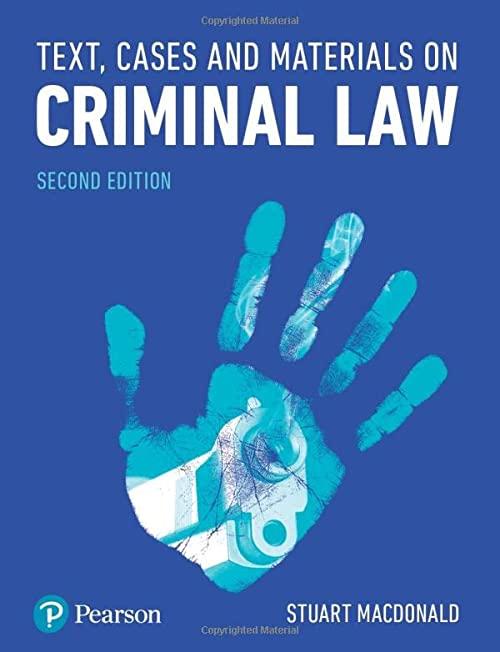Question
For two decades, a popular national pizza restaurant chain employed delivery drivers to deliver pizza to its customers in vehicles owned by the company. Earlier
For two decades, a popular national pizza restaurant chain employed delivery drivers to deliver pizza to its customers in vehicles owned by the company. Earlier this year, the pizza chain decided to terminate the employment of all of its drivers. At the same time, the pizza chain offered each driver the opportunity to enter into a contract to deliver pizza for the pizza chain on an "independent contractor" basis. The agreement, entitled "Independent-Contractor Delivery Driver Contract," provided that each driver would: (1) provide his/her own personal vehicle for making pizza deliveries; (2) use the vehicle only to deliver pizza for the pizza chain during normal business hours per the pizza chain's customary "call-in" delivery order process; and (3) receive weekly flat, hourly wages based upon a thirty-five hour workweek with no employee benefits. The agreement further specified that the pizza chain would reimburse delivery drivers for their fuel costs along with the cost of liability insurance coverage for their vehicles. Per the agreement, all terms of the agreement would end immediately upon termination of the driver's contract to deliver pizza for the pizza chain. Every delivery driver who had been originally employed by the pizza chain came to terms with the company and executed the aforementioned agreement. Three months ago, one such driver delivered a pizza to a longtime customer of the pizza chain during normal business hours. After the delivery had been completed, the customer asked the driver to take a birthday gift to his sister's house, located several miles away from the driver's next scheduled delivery, and offered him a twenty-dollar tip as an incentive. The driver agreed, anticipating that this extra delivery would take no more than thirty minutes. Upon arrival at the sister's house, the driver double-parked his delivery vehicle in front of the home in violation of a municipal ordinance because proper parking in the area was sparse and he wished to deliver the gift as swiftly as possible. While the driver was delivering the gift, a second vehicle traveling along the street fronting the sister's house suddenly swerved in order to avoid the driver's double-parked delivery vehicle. This second vehicle ended up veering into oncoming traffic, whereupon it was struck by a bus traveling in the opposite direction. As a consequence of these events, a passenger onboard the second vehicle suffered severe injuries that required hospitalization. The passenger has brought a tort claim against the pizza chain to recover damages for injuries resulting from the delivery driver's conduct. Evidence gathered prior to trial indicates that nearly all routine deliveries in the area are made while delivery vehicles are double-parked outside of the intended delivery address. In response to the passenger's tort claim, the pizza chain argued that it is not liable for the passenger's injuries because: (1) the driver is an independent contractor; (2) even if the driver is not an independent contractor, the driver was not making a delivery for the pizza chain at the time of the accident; and (3) the driver himself could not be found personally liable for the passenger's injuries. Prompts: 1. Given the facts above, how strong are each of the pizza chain's three arguments against liability here? Discuss fully. 2. Assuming that the pizza chain is liable to the passenger for the passenger's injuries, what rights, if any, does the pizza chain have against the driver? Discuss fully.
Step by Step Solution
There are 3 Steps involved in it
Step: 1

Get Instant Access to Expert-Tailored Solutions
See step-by-step solutions with expert insights and AI powered tools for academic success
Step: 2

Step: 3

Ace Your Homework with AI
Get the answers you need in no time with our AI-driven, step-by-step assistance
Get Started


